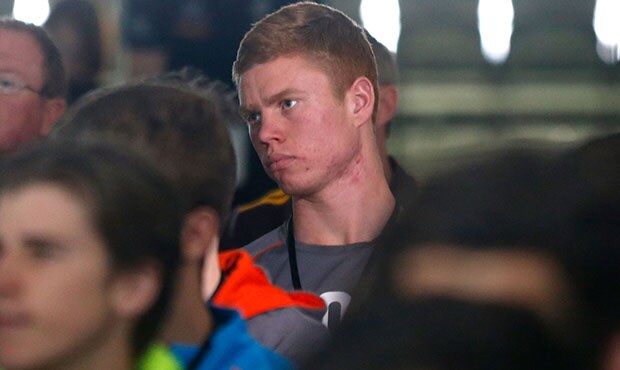“You can rule a player out and you can rule a player in based on what’s not on-field, especially when it marries with evidence that you’ve seen on-field.”
No, that is not something unearthed from inside a fortune cookie, that is the sentiment expressed by Gold Coast SUNS recruiting manager, Dom Ambrogio, when explaining the fundamental purpose of the interview process of prospective recruits.
Ambrogio, list manager Scott Clayton, and their entire recruiting team spend their lives watching grassroots football, trawling through analytics and playing the role of an investigative journalist. They are judged on the names they bring to the club, and in this game, the quality of player and person are both as important as each other. Hence the importance of the interview process.
Whilst there isn’t a lot of room to hide in a game, an interview, or a series of consultations, can be far more revealing. In a rare insight into the methods used by recruiters, Ambrogio and Clayton explained to goldcoastfc.com.au how the use of interviews with a player and their inner circle can lift the lid on a whole range of issues.
“The best example I can give is if you’ve got a question mark over someone’s work rate in games, where you don’t see them running or chasing hard enough, then you go and do some extra work on their character,” Ambrogio said.
“You might find that in other aspects of their life they don’t work very hard, they don’t train hard enough, they don’t live professionally, they don’t do all that sort of stuff, then the marrying of those two pieces of information you might rule that player out, even though their talent is good enough.”
During Ambrogio and Clayton’s time at the Western Bulldogs, the case of triple premiership defender Brian Lake stands out. Before being selected by the Dogs with pick No. 71 in the 2001 super draft, Clayton discovered that the South Australian had a medical condition which prevented him from performing at his best. Once exposed, the results were profound.
“The opposite can occur, like Brian Lake, who people questioned his work ethic and somehow we found out that he had sleep apnoea and had an adenoid problem. So he had a medical issue that if it was fixed he got this unbelievable improvement. That’s just being thorough. It’s an investigative journalist sort of view,” Clayton said.
“To find stuff like that out you just need to ask the right question to the right person. I liked his footy enough and there were some contradictions and I thought there’s something not quite right here. I got the right answers somewhere that made it worthwhile pursuing.”
Since the turn of the millennium, football has evolved into a massive business. Television rights, corporate sponsorship, membership numbers and media coverage have all reached unfathomable heights. For football clubs, the importance of success has never been more crucial with the gap between the have’s and the have nots widening by the year.
The foundation of success is built on acquiring the best talent and that is why some football experts strongly believe list managers are the most important people inside football clubs. After all, the coach can only coach with the players at his disposal. He can’t transform Johnny Drama into Vincent Chase, not even if he is Jock McHale.

A strong will to succeed and an aptitude for hard work are character traits Ambrogio is searching for. If a player has AFL qualities, but has issues with consistency, he wants to know if they lap up hard work, because if they do it points to a pattern of improvement.
“Often you investigate further with blokes that show glimpses, but are inconsistent. Sean Lemmens was a bit like that where he wouldn’t always deliver, but we wanted to know more about him so we did a bit of investigating and found out that he had fantastic character and we just knew that he would continue to work and improve and strive to get better and better and better,” Ambrogio said.
Gold Coast selected Victorian key forward Peter Wright with its first selection in last year’s national draft, collecting the teenager with pick No. 8. As part of their background research on Wright, Clayton revealed he and his staff spoke to more than a dozen people, including interviewing the Calder Cannons product on multiple occasions.
“We would have interviewed Peter three or four times. His father sat in on one. We spoke to all his coaches – Leon Harris who coached him at Maribyrnong College, Anton Grbac from Vic Metro, Ian Kyte from Calder. It would have been five or six different people,” Clayton said.
“But also the other key piece was I went on the AIS tour, which is now the NAB AFL Academy, and so through that you get a lot of feedback. We spoke to Kevin Sheehan (AFL National Talent Manager), Mick Ablett (AFL Academies Development Manager) and all the coaches through that, all the physios through that, all the high performance coaches through that and then we actually went on that tour and just observed,” Ambrogio said.
“We watched him, watched how he trained, watched the sort of person he is all that sort of stuff. It would be in the teens the amount of people you end up speaking to related to a particular player in some way shape or form.”
It’s easy to be seduced by scintillating debut seasons. Jaeger O’Meara’s Rising Star winning season immediately stamped himself as a superstar of the future and led to mild hysteria across the football landscape. But with key position players, it takes time for them to find their feet at the highest level.
For Ambrogio, Clayton and co, it is not a race. What they are looking for and what they measure is who provides the best output for the longest. It’s a fairly simple equation, but something that can be quickly overlooked in the media.
“The other key part is in recruiting, particularly in young players, is it’s not a race to who plays first, it’s who plays best for longest. It’s who’s going to give you the best football for their career,” Ambrogio said.
“Peter Wright was a very long-term view pick as well. He’s met our expectations so far in his first year. We expect him to keep going and going and going as he gets more conditioning under his belt and gets used to the system. He dominated the second tier, which for a big fella is bloody exciting. He’s going really well," Clayton said.


